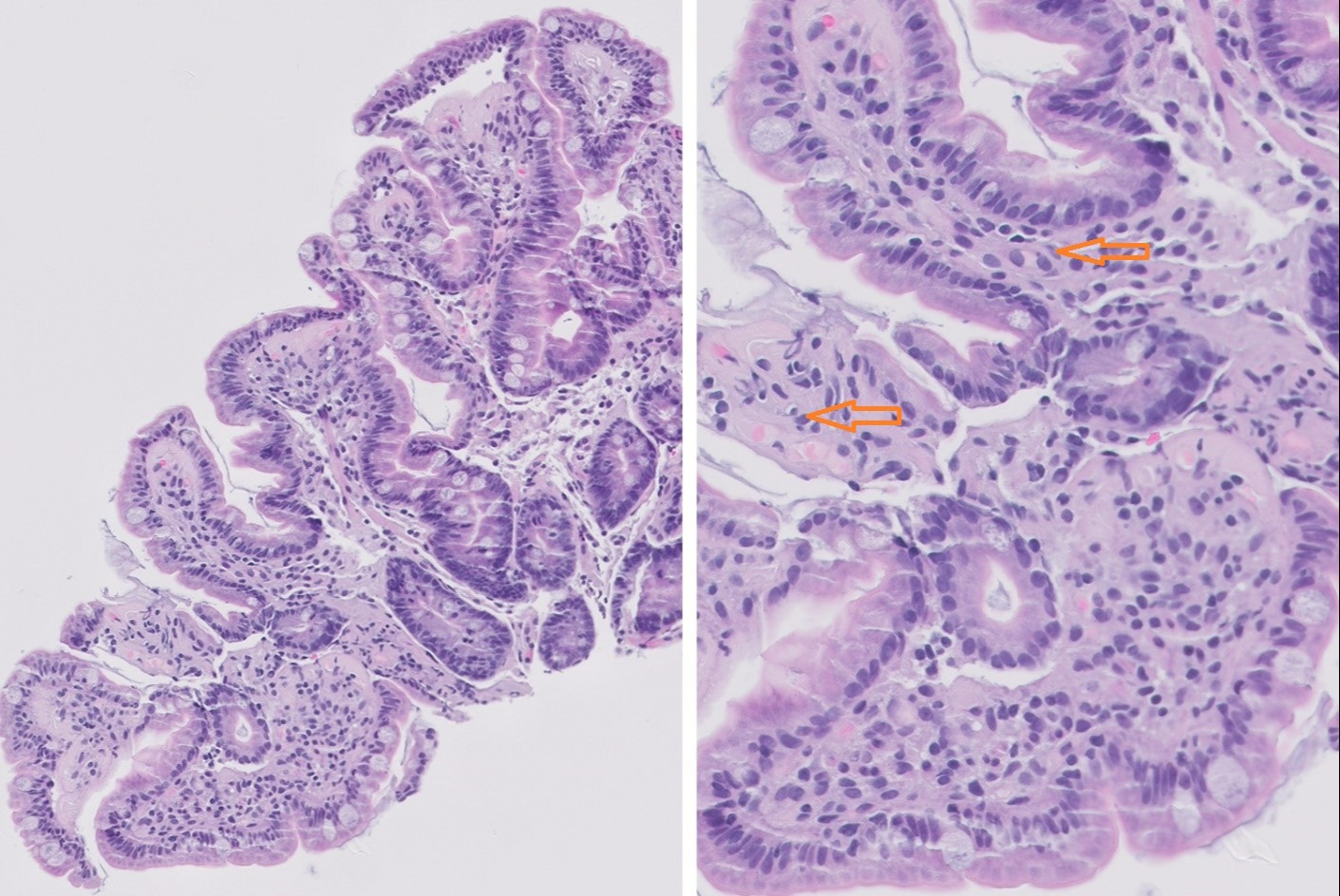Back
Oral Paper Presentation
Annual Scientific Meeting
Session: Plenary Session 3B - Colon / Small Bowel / Esophagus
51 - Common Variable Immunodeficiency-Like Enteropathy Associated With Rituximab B-Cell Depletion Therapy
Tuesday, October 25, 2022
3:05 PM – 3:15 PM ET
Location: Hall C1
- DH
David Hakimian, MD
University of Chicago
Chicago, IL
Presenting Author(s)
Award: Outstanding Research Award in the Small Intestine Category (Trainee)
David Hakimian, MD1, Dejan Micic, MD2, Lindsay Alpert, MD1, Carol Semrad, MD3
1University of Chicago, Chicago, IL; 2University of Chicago Medicine, Chicago, IL; 3University of Chicago Medical Center, Chicago, IL
Introduction: Rituximab (RTX), is a monoclonal antibody therapy directed at CD20 positive B lymphocytes, increasingly used in both malignant and autoimmune conditions. RTX therapy may result in hypogammaglobulinemia due to B cell depletion. The gastrointestinal side effects of the therapy are not well described. Here we report the clinical, endoscopic and histologic features of rituximab-associated enteropathy in a single center case series
Methods: Retrospective analysis of medical charts of patients with enteropathy presenting to a tertiary care university hospital between 2008 to 2021 were reviewed. Patients with enteropathy identified using diagnostic codes for: CVID, enteropathy, malabsorption, weight loss and diarrhea. Patients with rituximab use were further characterized. Clinical data, laboratory values, endoscopy and pathology reports were analyzed
Results: Ten patients with enteropathy associated with RTX therapy were identified without other competing etiology. Mean age was 64 years± 17.4 and five (50%) patients were female. Lymphoma 8 (80%) was the most common indication for RTX therapy . Diarrhea and weight loss were the most common clinical presentation. The mean BMI on presentation was 18 kg/m² with a mean total weight loss of 13.5 kg±8.9. Seven (70%) patients were defined as severely malnourished based on clinical criteria. Mean albumin was 3.3 g/dL(3.5-5) and pre-Albumin 16 g/dL. (normal >21) Serum levels of IgA, IgM and IgG were below lower limit of normal. Endoscopic appearance of the duodenal mucosa was abnormal in 3/8 cases (37.5%) and 3/5 (60%) cases had decreased plasma cells in the lamina propria with villous atrophy (Figure I). Seven patients (70%) had a pathologic diagnosis consistent with CVID enteropathy. All of the patients received IVIG therapy (100%) although only 2 had symptomatic improvement. Prednisone(n=6), budesonide(n=2), infliximab(n=2) or vedolizumab(n=1) did not lead to clinical improvement. Six (60%) required long term parenteral nutrition (PN).
Discussion: RTX is associated with a secondary CVID-like enteropathy with absent/decreased plasma cells in small bowel biopsies. Diarrhea with weight loss and severe malnutrition are common clinical features and patients often require parenteral nutrition. Treatment with IVIG and other immunosuppressive therapies rarely improves GI symptoms. RTX-associated enteropathy should be considered in patients presenting with diarrhea and/or weight loss and history of RTX use

Disclosures:
David Hakimian, MD1, Dejan Micic, MD2, Lindsay Alpert, MD1, Carol Semrad, MD3, 51, Common Variable Immunodeficiency-Like Enteropathy Associated With Rituximab B-Cell Depletion Therapy, ACG 2022 Annual Scientific Meeting Abstracts. Charlotte, NC: American College of Gastroenterology.
David Hakimian, MD1, Dejan Micic, MD2, Lindsay Alpert, MD1, Carol Semrad, MD3
1University of Chicago, Chicago, IL; 2University of Chicago Medicine, Chicago, IL; 3University of Chicago Medical Center, Chicago, IL
Introduction: Rituximab (RTX), is a monoclonal antibody therapy directed at CD20 positive B lymphocytes, increasingly used in both malignant and autoimmune conditions. RTX therapy may result in hypogammaglobulinemia due to B cell depletion. The gastrointestinal side effects of the therapy are not well described. Here we report the clinical, endoscopic and histologic features of rituximab-associated enteropathy in a single center case series
Methods: Retrospective analysis of medical charts of patients with enteropathy presenting to a tertiary care university hospital between 2008 to 2021 were reviewed. Patients with enteropathy identified using diagnostic codes for: CVID, enteropathy, malabsorption, weight loss and diarrhea. Patients with rituximab use were further characterized. Clinical data, laboratory values, endoscopy and pathology reports were analyzed
Results: Ten patients with enteropathy associated with RTX therapy were identified without other competing etiology. Mean age was 64 years± 17.4 and five (50%) patients were female. Lymphoma 8 (80%) was the most common indication for RTX therapy . Diarrhea and weight loss were the most common clinical presentation. The mean BMI on presentation was 18 kg/m² with a mean total weight loss of 13.5 kg±8.9. Seven (70%) patients were defined as severely malnourished based on clinical criteria. Mean albumin was 3.3 g/dL(3.5-5) and pre-Albumin 16 g/dL. (normal >21) Serum levels of IgA, IgM and IgG were below lower limit of normal. Endoscopic appearance of the duodenal mucosa was abnormal in 3/8 cases (37.5%) and 3/5 (60%) cases had decreased plasma cells in the lamina propria with villous atrophy (Figure I). Seven patients (70%) had a pathologic diagnosis consistent with CVID enteropathy. All of the patients received IVIG therapy (100%) although only 2 had symptomatic improvement. Prednisone(n=6), budesonide(n=2), infliximab(n=2) or vedolizumab(n=1) did not lead to clinical improvement. Six (60%) required long term parenteral nutrition (PN).
Discussion: RTX is associated with a secondary CVID-like enteropathy with absent/decreased plasma cells in small bowel biopsies. Diarrhea with weight loss and severe malnutrition are common clinical features and patients often require parenteral nutrition. Treatment with IVIG and other immunosuppressive therapies rarely improves GI symptoms. RTX-associated enteropathy should be considered in patients presenting with diarrhea and/or weight loss and history of RTX use

Figure: Figure I.Small bowel mucosa showing a lack of lamina propria plasma cells (arrows)
Disclosures:
David Hakimian indicated no relevant financial relationships.
Dejan Micic indicated no relevant financial relationships.
Lindsay Alpert indicated no relevant financial relationships.
Carol Semrad indicated no relevant financial relationships.
David Hakimian, MD1, Dejan Micic, MD2, Lindsay Alpert, MD1, Carol Semrad, MD3, 51, Common Variable Immunodeficiency-Like Enteropathy Associated With Rituximab B-Cell Depletion Therapy, ACG 2022 Annual Scientific Meeting Abstracts. Charlotte, NC: American College of Gastroenterology.


